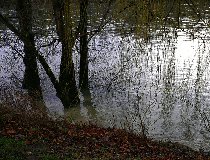Abusing the environment: an Islamic perspective
17/11/2016| IslamWeb
Islam shows great concern for the environment. A number of verses in the Quran and the sayings of Prophet Muhammad ![]() have addressed this issue.
have addressed this issue.
Islam’s solution to environmental problems lies in man’s adaptation of the guidance of Islam. Allah has stated that He made all the material objects on earth for man’s use, and not for his abuse.
Allah Almighty has not prevented humankind from enjoying a luxurious standard of living, but this should not be maintained by damaging and abusing natural resources. This is clearly stated in a number of verses in the Quran. Allah says (what means):"But seek, through that which Allah has given you, the home of the Hereafter; and (yet), do not forget your share of the world. And do good as Allah has done good to you. And desire not corruption in the land. Indeed, Allah does not like corruptors.“ [Quran 28:77]
The Quran and the Sunnah of Prophet Muhammad ![]() contains instructions for Muslims to preserve the environment, which includes not cutting down trees unnecessarily. In this respect, Prophet Muhammad
contains instructions for Muslims to preserve the environment, which includes not cutting down trees unnecessarily. In this respect, Prophet Muhammad ![]() pointed out that there are benefits in planting trees, which will last until the Day of Judgment. This is illustrated in the saying of the Noble Prophet
pointed out that there are benefits in planting trees, which will last until the Day of Judgment. This is illustrated in the saying of the Noble Prophet ![]() : "If the Last Hour is imminent while one of you has a palm seedling in his hand (which he can plant before it happens), then let him plant it.” [Reported by Ahmad and Al-Bukhari]
: "If the Last Hour is imminent while one of you has a palm seedling in his hand (which he can plant before it happens), then let him plant it.” [Reported by Ahmad and Al-Bukhari]
Allah has ordained severe punishments for those who damage and abuse natural resources. Allah Says (what means): “Eat and drink from the provision of Allah, and do not commit abuse on the earth, spreading corruption." [Quran 2:60]
"Corruption has appeared throughout the land and sea by (reason of) what the hands of people have earned, so He (i.e. Allah) may let them taste part of (the consequences of) what they have done that perhaps they will return (to righteousness).” [Quran 30:41]
Ibn Mas'ood, may Allah be pleased with him, reports, "While we were on a journey with Allah's Messenger ![]() he went a short distance from where we had encamped. There we saw a small bird with two of its chicks and caught them. The bird was fluttering when the Prophet
he went a short distance from where we had encamped. There we saw a small bird with two of its chicks and caught them. The bird was fluttering when the Prophet ![]() came back, so he
came back, so he ![]() asked, 'Who has distressed it by taking its chicks?' Then he
asked, 'Who has distressed it by taking its chicks?' Then he ![]() asked us to return the chicks. There we also saw an anthill and burnt it out. When the Prophet
asked us to return the chicks. There we also saw an anthill and burnt it out. When the Prophet ![]() saw that, he asked, 'Who has burnt it?' When we informed him that we had done it, he said, “Only the Lord of fire has the right to punish with fire.”
saw that, he asked, 'Who has burnt it?' When we informed him that we had done it, he said, “Only the Lord of fire has the right to punish with fire.”
Allah says in the Quran (what means): "And there is no creature on (or within) the earth or a bird that flies with its wings except that they are nations (communities) like you." [Quran 6:38]
We infer from the Prophet’s statement and this Quranic verse that all living things are partners to man in existence and they deserve our respect. We must be merciful towards animals and strive to ensure the preservation of different species.
Islam forbids wasting water and using it without benefit. The preservation of water for the nourishment of humankind, animal life, bird life and vegetation is a practice that gains Allah’s pleasure.
In his article "Islam and the Environment," Arafat El Ashi, director of the Muslim World League in Canada, [www.al-muslim.org ] writes, "Human life is sacred in the sight of Islam. No one is permitted to take the life of another person except as life-for-life."
Under Islam, El Ashi states, "It [is] incumbent on every Muslim to contribute his/her share in improving greenery. Muslims should be active in growing more trees for the benefit of all people." Even during battle, Muslims are required to avoid cutting down trees that are useful to people.
Humankind’s stewardship of the earth entails a profound responsibility. Other living species, as mentioned above, are also considered by Allah to be “communities”. Creation itself, in its boundless diversity and complexity, may be thought of as a vast universe of “signs” of Allah’s Power, Wisdom, Beneficence and Majesty. The responsibility of humankind is to keep Allah’s creation undistorted. The environment is a trust presented by Allah to humankind and its abuse is a misuse of Allah’s trust.

